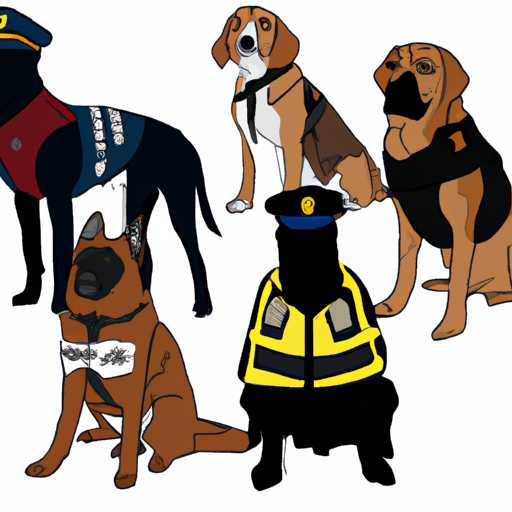As a caregiver, you know the importance of having the right tools and support to take care of those who depend on you. In the same vein, police departments worldwide rely on specific breeds of dogs to help them carry out their duties. These dogs are not just companions; they are working members of the police force, trained to perform tasks that humans can’t. Let’s delve into the world of police dogs and find out what breeds are commonly utilized and why.
H2: The Role of Dogs in Police Work
Imagine a role where you are expected to be a detective, a protector, and a beloved team member. This is the life of a police dog. Police dogs, also known as K9 units, are trained to perform a variety of tasks that support police work:
- Tracking and Apprehension: Dogs have an incredible sense of smell that allows them to track humans or items over long distances. Not only can they find missing persons or suspects on the run, but they can also apprehend them if needed.
- Drug Detection: Some dogs are trained to sniff out illegal substances. These dogs play a crucial role in border control and airport security.
- Explosive Detection: Similar to drug detection dogs, some dogs are trained to detect explosives. This is particularly important in areas with a high-security threat.
- Search and Rescue: In the event of natural disasters or accidents, some dogs are trained to search for and rescue trapped or injured individuals.
H2: Common Breeds of Police Dogs
While any breed of dog can be trained for police work, some breeds are more commonly used due to their natural abilities and characteristics. Here are the top five breeds used in police work:
- German Shepherds: Known for their intelligence and versatility, German Shepherds are the most common breed used in police work. They are strong, obedient, and have an excellent sense of smell.
- Belgian Malinois: Similar to German Shepherds in many ways, Belgian Malinois are also commonly used in police work. They are known for their agility, endurance, and strong work ethic.
- Labrador Retrievers: Labs are often used for detection work due to their incredible sense of smell. They are also very friendly and obedient, making them great for public interaction.
- Bloodhounds: Known for their tracking abilities, Bloodhounds have been used for centuries to track humans. They have the best sense of smell of any breed.
- Boxers: Boxers are strong and agile, making them great for apprehension work. They are also very obedient and have a strong desire to please.
| Breed | Role | Characteristics |
|---|---|---|
| German Shepherds | Universal | Intelligent, Versatile |
| Belgian Malinois | Universal | Agile, Endurance |
| Labrador Retrievers | Detection | Friendly, Obedient |
| Bloodhounds | Tracking | Best sense of smell |
| Boxers | Apprehension | Strong, Obedient |
H2: The Training Process
The training process for police dogs is intense and thorough. It begins when the dogs are puppies and involves rigorous physical and mental exercises. The training is tailored to the specific role that the dog will play in the police force. For example, a dog trained for detection work will undergo different training than a dog trained for apprehension work. This intensive training ensures that the dogs are well-prepared for the high-stress situations they will encounter in their work.
H2: The Importance of Police Dogs
Police dogs play an invaluable role in law enforcement. Their unique skills and abilities allow them to perform tasks that would be impossible for humans to do. They can track suspects, find missing persons, detect drugs or explosives, and apprehend criminals. They are also a comforting presence for the police officers they work with and the communities they serve.
H2: FAQs
1. Can any breed of dog become a police dog?
While any breed of dog can be trained for police work, some breeds are more commonly used due to their natural abilities and characteristics.
2. How long does it take to train a police dog?
Training a police dog is a lengthy process that can take several months to over a year, depending on the specific role the dog will play.
3. Do police dogs live with their handlers?
Yes, most police dogs live with their handlers. This helps to build a strong bond between the dog and the handler.
4. Can police dogs be adopted after retirement?
Yes, many retired police dogs are adopted by their handlers. If the handler cannot adopt the dog, it may be adopted by another police officer or a member of the public.
5. Do police dogs get special training to deal with stress?
Yes, part of the training process for police dogs involves preparing them for the high-stress situations they will encounter in their work. This includes exposure to loud noises, large crowds, and unfamiliar environments.



